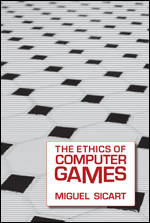My former colleague Miguel Sicart has just published his book The Ethics of Computer Games on MIT Press.

Description
Despite the emergence of computer games as a dominant cultural industry (and the accompanying emergence of computer games as the subject of scholarly research), we know little or nothing about the ethics of computer games. Considerations of the morality of computer games seldom go beyond intermittent portrayals of them in the mass media as training devices for teenage serial killers. In this first scholarly exploration of the subject, Miguel Sicart addresses broader issues about the ethics of games, the ethics of playing the games, and the ethical responsibilities of game designers. He argues that computer games are ethical objects, that computer game players are ethical agents, and that the ethics of computer games should be seen as a complex network of responsibilities and moral duties. Players should not be considered passive amoral creatures; they reflect, relate, and create with ethical minds. The games they play are ethical systems, with rules that create gameworlds with values at play.
Drawing on concepts from philosophy and game studies, Sicart proposes a framework for analyzing the ethics of computer games as both designed objects and player experiences. After presenting his core theoretical arguments and offering a general theory for understanding computer game ethics, Sicart offers case studies examining single-player games (using Bioshock as an example), multiplayer games (illustrated by Defcon), and online gameworlds (illustrated by World of Warcraft) from an ethical perspective. He explores issues raised by unethical content in computer games and its possible effect on players and offers a synthesis of design theory and ethics that could be used as both analytical tool and inspiration in the creation of ethical gameplay.
About the Author
Miguel Sicart is Assistant Professor at the Center for Computer Game Research, IT University Copenhagen

A great book to read is “Killing Monsters” in regards to the effect or reason children love video games or make believe. Having 3 children(all boys) myself, it really makes sense. IMO even talking “ethical” in regards to video games would be like talking about the ethical nature of movies or books. Sure, some go over the top, but, ethical? :/
Ron, I think it makes sense to see games as being inherently better at addressing ethical issues than movies or books – games offer choice to the player, after all.
“Ethical” criticism forms an important part of current literary studies. Some names to look up: Wayne Booth, Martha Nussbaum, Richard Rorty.